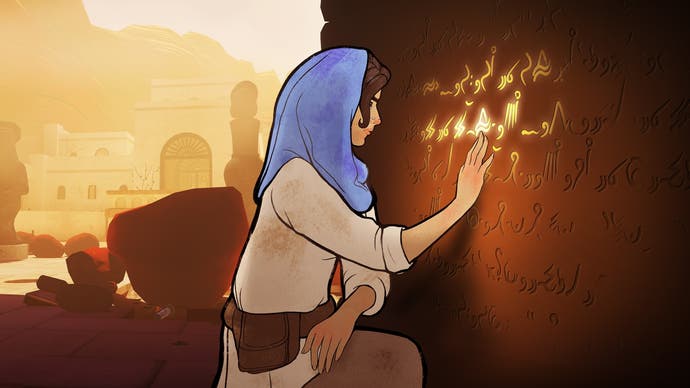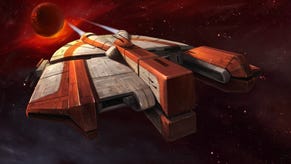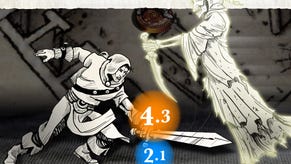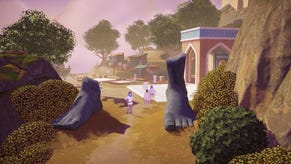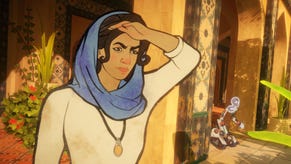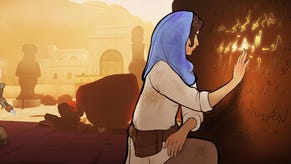Heaven's Vault review - a rich web of possibility
Downriver.
Like 80 Days, Inkle's previous game, Heaven's Vault is a piece of interactive storytelling that drops you into a dense mesh of narrative choices. The whole thing's as intricate and inter-connected, perhaps, as one of the tiled abstract patterns that decorate the walls and doorways of the game's Middle-Eastern and North-African-inspired environments. What a place! There are big decisions to be made here, but, most thrillingly, throughout the course of the adventure I found myself surrounded by the constant fluttering of smaller choices - how much to reveal to an ally, how to respond to my companion's latest micro-aggression, and whether, even, to interpret it as an aggression at all. Somehow, all these hubs and spokes come together in a busy kind of snugness. As a player I felt both autonomous and well-cared for. I could play the game as I saw fit in any moment, but whatever I did, the overall story refused to become an ugly, artless blob formed by my actions.
A better analogy might be the river. In Heaven's Vault you play Aliya, an archaeologist following in the footsteps of a vanished roboticist who has discovered something darkly mesmerising out there in the wastelands of space. That's as much direct plot as I should spoil here. Stepping back a bit, Aliya's job involves moving between sites of interest and using the things she finds - artefacts and tatters of an ancient language - to create new leads and new spots on the map to investigate. You're a space traveller in a head scarf rather than a pressurised helmet, and your spaceship is made of wood and sails and knotted ropes and looks a bit like a winged crustacean. And space itself, a scattering of 'moons', is an archipelago navigated by the river, a knotted delta of swift tributaries, cloudy white trails scattered over glinting rocks. You never saw such rocks. Some of them are pointed and arid and reach into the sky like the columns of gas that incubate new stars in the Eagle Nebula. Some are slick with a glossy mineral wetness, reflecting the pinks and purples of a skybox in which, if you look closely enough, you can see individual brush strokes.
The river will take you where you want to go as you move between one clue and the next, but once you're on it there is a sense of its own brisk life to it. It bucks and rumbles and speeds you through turns before growing sluggish for a spell and making you fight against it. There are things to see along the route if you are fast enough, and as long as you have learned how to ride the river and navigate its moods. But if you miss these things, they're gone for now. Only forward - and such is the narrative. Live with your choices, even the ones you don't realise you're making.
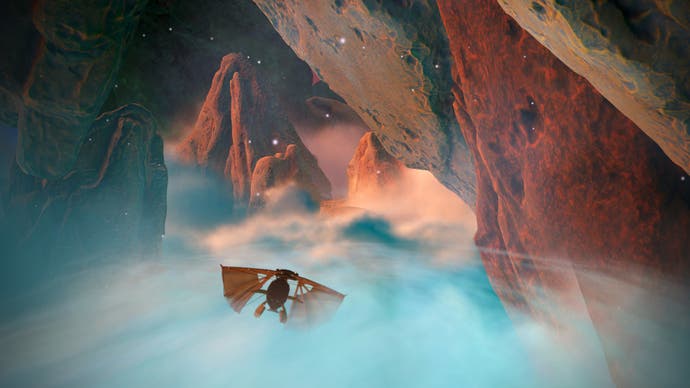
Outside of the river, the game offers dozens of moons to explore: farm moons, market moons rich with crowds to interrogate, desolate moons where hidden temples might lurk in the next dust storm. Superficially you're hunting for the bright dots that announce interactive hotspots, but as you collect artefacts and investigate the environment you're learning about the unstable hierarchy of this strange place - the bitterness and distrust and jealousy that sticks the various strata together, the shared ignorance of the past that grows more and more problematic as vague catastrophe looms. More than anything, Heaven's Vault is filled with interesting people to meet and talk to. They bear grudges, and they frequently remember things that have happened long before the player was dropped into the game. As a result, the overwhelming feeling is that, while you perform the role of Aliya, there is a gap between the two of you that can never quite be closed. At times I was unsure whether to make choices for myself or for her, a distinct entity, determined, stubborn, brilliantly clever, wounded?
Heaven's Vault is filled with ingenious stuff, whether it's the nearly-invisible shifting of power in a relationship as events unfold or the way that your actions and discoveries slowly fill in a timeline that measures events in minutes but also telescopes outwards to capture years and centuries. This thing is a wonder, a narrative inversion of the tech tree from Civ, almost, in which rather than unlock new abilities you steadily recontextualise your own knowledge. Cleverest of all the game's tricks, though, is the way that it builds its powerfully active sense of archaeology around translation - and the way, to make this work, it shares the burden between the player and Aliya, activating that curious distance between the people on either side of the screen.
Pieces of text are everywhere in this universe, scratched on lintels, carved into strange ancient devices. When Aliya finds a new example, it's up to you both to work out what it says - or at least to agree on what it might say. This is done by considering everything from word shape to the syntax of a phrase. You start by examining the text and breaking it down into possible words, choosing from a selection that Aliya has clearly been considering. The possible words have possible meanings, and as you compare these possible meanings you also consider how possible words are going to fit together into sentences, and what those sentences are likely to say given the physical location of the text.
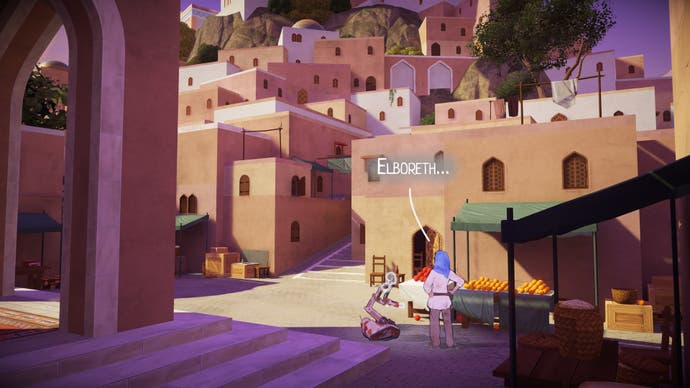
Over time, Aliya disregards certain possible translations and firms up others. Moving further out, the individual characters and their arrangements come to direct your thinking too. It's astonishing how well the design team has taken something inherently puzzley and refused to reduce it to a mere puzzle, if that makes sense. Language bucks and fidgets with nuance. The context, as ever, is crucial, and while there are right and wrong answers, the sense of the value of interpretation is never lost.
Testify! Speaking of words, the word for Heaven's Vault is pensive, I think. Pensive used as a word that sets thought in motion, sometimes drifting, sometimes searching, sometimes melancholy, but always moving. Back and forth, returning, reworking, revisiting from another angle. It reminds me: as Aliya passes through this strange yet familiar world, a 2D model in a 3D space, she shifts between different painted poses, settling for a second by a tree or faltering in a doorway. These thoughts, the animation seems to say, as it shuffles one pose into place next to another, can lead in a thousand directions. These thoughts can take you anywhere.
